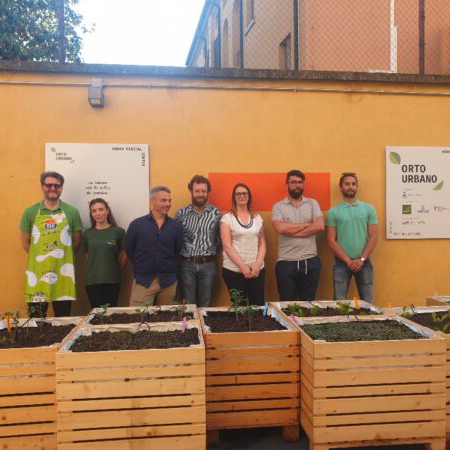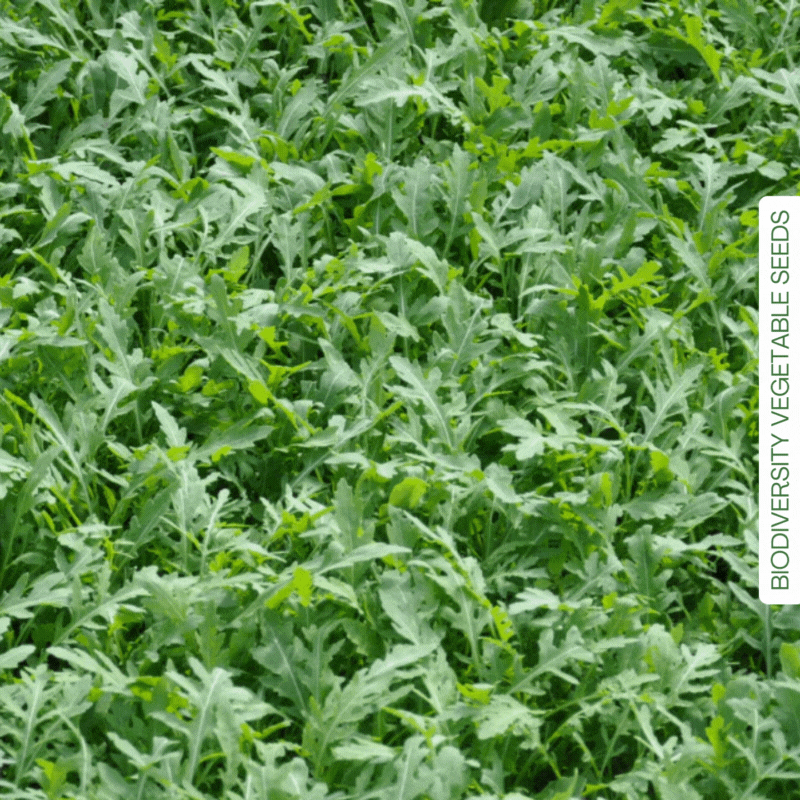
After the work of tactical urbanism created in September 2021 by the Apulian artist Skolp, the Courtyard Space of Urban Digital Center - Innovation Lab has been enriched with an urban vegetable garden created thanks to the partnership with NaturaSi, Smarties.bio and ANGA - Giovani di Confagricoltura di Rovigo.
An inauguration that marks the beginning of a path aimed at approaching and raising awareness of sustainability issues and healthy eating, reducing waste, in line with the territorial animation activities launched by the Polesine Innovation Lab in 2021 on the 17 goals of the UN 2030 Agenda.
"Through this project," reports Carlo Murer of NaturaSì, "we are pursuing two goals: to explore the possibility of replicating organic productive gardens and vegetable gardens in city areas, to alleviate food shortages in urban systems where the resource 'land to grow' is increasingly scarce.
This also supports cities in the fight against global warming and allows them to experiment with seeds and thus varieties of vegetables resilient to the changing climate and the progressive drying up of entire areas, including in our country.
The second goal is to bring citizens, and especially younger people, back in touch with cultivation, with the development of the seed into a plant, with taking care of plants by obtaining fruits and vegetables, while also confronting the increasing difficulties that the climate presents to those who cultivate."
Claudio Previatello president - Giovani di Confagricoltura of Rovigo emphasizes that "nothing grows without cultivating, today more than ever Anga wants to grow and grow, cultivating together a better future. We intend to do this with the help of the new technologies at our disposal and our experience as farmers.
It is through the promotion of projects like this one that we can make our contribution to raising awareness of sustainable food development and educating people about the seasonality of the products of the earth and thus choose genuine, sustainable and local, and therefore quality food."
A young business specializing in seed production also contributed to the creation of the garden with a research activity and special focus also on the recovery of the region's vegetables and local excellence.
In fact, Andrea Ghedina reports, "Smarties.bio has chosen to be a partner of URBAN DIGITAL CENTER - Innovation Lab of the Municipality of Rovigo within the Urban Garden project to provide its know-how for the design and implementation of the same.
In fact, it has undertaken an important collaboration between public administration and private sector for an innovative project that connects agricultural tradition to the community. The Urban Garden is an interesting solution for Smarties to eat healthy, local and rediscover the values of the Earth.
The value of this partnership lies in Smarties.bio's philosophy: the environment is a common good, everyone's, and therefore it must be preserved."
The inauguration of the urban garden was followed by a seminar sponsored by Iuav - Planning & Climate Change entitled "Innovative and Sustainable Business Realities: Circular Design and Circular Economy for Local Development" with moderation by Gianmarco Giustino, Iuav researcher.
In fact, the path of territorial animation on the goals (SDGs) of the UN 2030 Agenda continues as part of the Urban Digital Center - InnovationLab project in collaboration with the Iuav University of Venice.
There were four speeches with work opened by a greeting from Councillor for Innovation Luisa Cattozzo and an introduction by Laura Badalucco, professor of industrial design at Iuav, who introduced the topic by pointing out how packaging and good planning affect on average 80 percent of the impact of a given product.
Erika Francescon, a consultant, winner of the Design4Service hackathon and founder of Sustain Me, presented the activities of her new reality: "We are a hub for companies that from the very first moment wanted to go beyond the existing platforms, where only diagnoses are received. We, with digitized content and in-person consulting, try to find solutions and identify strategies."
A new way of thinking about the company and a systemic approach that focuses on sustainability and reuse and that has won such excellence as, for example, the Ecoesedra studio, a reality from Treviso that works successfully in industrial design.
Andrea Bedendo continued with the experience of Be Compost, known for its use of biodegradable and compostable materials and especially its chemical toilets: "Large events are often linked to pollution but in our opinion they are and must be an opportunity to promote sustainability. Knowing that we are not putting new plastic into the market with our products is something that fills us with pride."
An inauguration that marks the beginning of a path aimed at approaching and raising awareness of sustainability issues and healthy eating, reducing waste, in line with the territorial animation activities launched by the Polesine Innovation Lab in 2021 on the 17 goals of the UN 2030 Agenda.
"Through this project," reports Carlo Murer of NaturaSì, "we are pursuing two goals: to explore the possibility of replicating organic productive gardens and vegetable gardens in city areas, to alleviate food shortages in urban systems where the resource 'land to grow' is increasingly scarce.
This also supports cities in the fight against global warming and allows them to experiment with seeds and thus varieties of vegetables resilient to the changing climate and the progressive drying up of entire areas, including in our country.
The second goal is to bring citizens, and especially younger people, back in touch with cultivation, with the development of the seed into a plant, with taking care of plants by obtaining fruits and vegetables, while also confronting the increasing difficulties that the climate presents to those who cultivate."
Claudio Previatello president - Giovani di Confagricoltura of Rovigo emphasizes that "nothing grows without cultivating, today more than ever Anga wants to grow and grow, cultivating together a better future. We intend to do this with the help of the new technologies at our disposal and our experience as farmers.
It is through the promotion of projects like this one that we can make our contribution to raising awareness of sustainable food development and educating people about the seasonality of the products of the earth and thus choose genuine, sustainable and local, and therefore quality food."
A young business specializing in seed production also contributed to the creation of the garden with a research activity and special focus also on the recovery of the region's vegetables and local excellence.
In fact, Andrea Ghedina reports, "Smarties.bio has chosen to be a partner of URBAN DIGITAL CENTER - Innovation Lab of the Municipality of Rovigo within the Urban Garden project to provide its know-how for the design and implementation of the same.
In fact, it has undertaken an important collaboration between public administration and private sector for an innovative project that connects agricultural tradition to the community. The Urban Garden is an interesting solution for Smarties to eat healthy, local and rediscover the values of the Earth.
The value of this partnership lies in Smarties.bio's philosophy: the environment is a common good, everyone's, and therefore it must be preserved."
The inauguration of the urban garden was followed by a seminar sponsored by Iuav - Planning & Climate Change entitled "Innovative and Sustainable Business Realities: Circular Design and Circular Economy for Local Development" with moderation by Gianmarco Giustino, Iuav researcher.
In fact, the path of territorial animation on the goals (SDGs) of the UN 2030 Agenda continues as part of the Urban Digital Center - InnovationLab project in collaboration with the Iuav University of Venice.
There were four speeches with work opened by a greeting from Councillor for Innovation Luisa Cattozzo and an introduction by Laura Badalucco, professor of industrial design at Iuav, who introduced the topic by pointing out how packaging and good planning affect on average 80 percent of the impact of a given product.
Erika Francescon, a consultant, winner of the Design4Service hackathon and founder of Sustain Me, presented the activities of her new reality: "We are a hub for companies that from the very first moment wanted to go beyond the existing platforms, where only diagnoses are received. We, with digitized content and in-person consulting, try to find solutions and identify strategies."
A new way of thinking about the company and a systemic approach that focuses on sustainability and reuse and that has won such excellence as, for example, the Ecoesedra studio, a reality from Treviso that works successfully in industrial design.
Andrea Bedendo continued with the experience of Be Compost, known for its use of biodegradable and compostable materials and especially its chemical toilets: "Large events are often linked to pollution but in our opinion they are and must be an opportunity to promote sustainability. Knowing that we are not putting new plastic into the market with our products is something that fills us with pride."
Instead, Dennis Fenzi, ambassador of Abafoods, retraced the history of a pioneering company in the field of biodiversity, active in the market for more than 20 years and now a leader in its market segment after a not-so-easy start. "Ours is a type of attentive and prepared clientele," these are his words, "but a company is only successful if the consumer recognizes the quality of the product.
With processing waste, we have gone from cookies to pellets for our partners' laying hens, and today we are ourselves producers and growers of the raw materials that we then process, but we are also about to inaugurate a new wing of the plant, renovated and devoted to energy saving: we aim for a type of capitalism that is truly social."
Lastly, Carlo Murer, for NaturaSì, closed by telling of the small miracle performed by a city store that has now become a company with 500 stores in Italy and 300 supplier companies as well as a nonprofit foundation that seeks to spread a new way of thinking.
"The farmer," these are his words, "can either be the cause of the problem or its solution; agriculture is responsible for 40 percent of emissions but it can also be a source of depollution, for example by reversing course with regenerative practices and biodynamics.
An atypical and countercultural message that is also reflected on the animals, who are not mistreated and are indeed assured a scenario of "just present" and dignified existence, and on humans, with the absolute rejection of all forms of caporalism and worker exploitation.
With processing waste, we have gone from cookies to pellets for our partners' laying hens, and today we are ourselves producers and growers of the raw materials that we then process, but we are also about to inaugurate a new wing of the plant, renovated and devoted to energy saving: we aim for a type of capitalism that is truly social."
Lastly, Carlo Murer, for NaturaSì, closed by telling of the small miracle performed by a city store that has now become a company with 500 stores in Italy and 300 supplier companies as well as a nonprofit foundation that seeks to spread a new way of thinking.
"The farmer," these are his words, "can either be the cause of the problem or its solution; agriculture is responsible for 40 percent of emissions but it can also be a source of depollution, for example by reversing course with regenerative practices and biodynamics.
An atypical and countercultural message that is also reflected on the animals, who are not mistreated and are indeed assured a scenario of "just present" and dignified existence, and on humans, with the absolute rejection of all forms of caporalism and worker exploitation.


